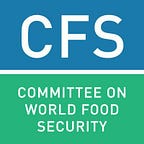Investing for good
How responsible agricultural investment can generate positive social impact
When you buy a t-shirt or eat at a restaurant, do you ever ask yourself what effect the money you are spending can have on society?
Producing and purchasing food, agricultural goods and services that respect human rights and don’t harm the planet — in other words, that are responsible and sustainable — can reduce poverty and hunger, encourage decent working conditions and promote environmentally-friendly production methods.
In 2014 the Committee on World Food Security (CFS) prepared and endorsed the Principles for Responsible Investment in Agriculture and Food Systems (RAI), ten globally applicable principles that address a wide range of environmental, social and economic issues.
“Investment” may sound like a complex concept, but in reality even small, everyday purchases can be considered investments.
Responsible investment in agriculture and food systems means investing more equally and more sustainably and ensuring that it benefits those who need it most.
Great, but what can I do?
It’s easier to help than you might think. Wherever you live and whether you are a farmer, in the agri-food business or a conscious citizen, these are few examples of things you can do to make a positive difference and promote responsible agricultural investment.
At the market
Buy eggs, meat and dairy products from genuinely free range farms
Free range farming is more than just an ethical way of treating animals: animals raised in free range farms are more resistant to diseases than closely confined animals. Therefore, animal products coming from free range farms are more healthy and nutritious.
Free range animals also help to recycle nutrients and contribute to soil fertility creating a positive cycle of healthy and productive farming.
Buy goods produced by local farmers
Buying goods produced and distributed locally can have astounding advantages. Not only will the fruit and vegetables be fresher and tastier, often they will be healthier too.
Supporting local agriculture can also create jobs in rural areas, protect local biodiversity, and minimize pollution and transportation costs.
Read the labels
Whether you’re buying food or clothes, labels provide key information on where the product came from and who’s made it. Reading labels will make sure that you know when you are buying safe and sustainable products.
In the work place
If you work in a food or agriculture related business there is a lot you can do to promote responsible investment and sustainable food systems.
Promote decent work
Decent work means fair pay, a safe and equal working environment and social protection mechanisms: all these are key elements to foster economic growth, reduce poverty and promote social justice. A happy worker is a productive worker and studies have shown that, for example, providing on-site childcare facilities and supporting new mothers who are breastfeeding significantly reduces turnover and absenteeism
Engage youth
Youth is a driver of change and the returns for investing in today’s young people are huge. Providing access to technologies, on-the-job training and mentorship programmes for youth to increase their capacity can boost their ability to innovate and contribute to local development.
Implement an efficient tracking and labelling system
Tracking and reporting responsible investment on the label is a great way to enhance your company’s reputation, increase customer loyalty and attract new clients. For example, a t-shirt retailer should make sure that the label states all responsible investment activities carried out throughout production — from the cotton field to the shelf.
In your community
While as a single individual you can do a lot, building a better society is a collective effort.
You could start small by informing the people closest to you — friends, family, co-workers and neighbours — on responsible investment, but you could also think about larger initiatives such as campaigning on social media, setting up school programmes to educate children on the importance of investing responsibly in agriculture, or persuading food and beverage companies in your area to use sustainable products and services.
You could even contact producer and consumers associations to make sure that the RAI Principles are supported, promoted and utilized by all stakeholders.
However you choose to support responsible investment, it is important that we all contribute to more sustainable food systems for a more equal, inclusive and food secure world.
Would you like some more ideas on what you can do to support responsible investment in agriculture and food systems? Learn more here and follow us on Twitter and Facebook!
